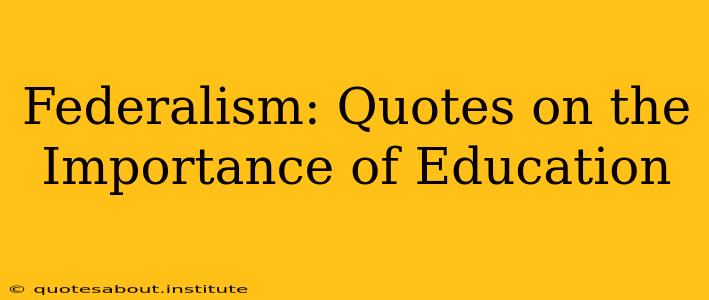Federalism, the division of power between a central government and smaller, regional governments, significantly impacts education systems worldwide. The balance of authority determines funding, curriculum standards, and even teacher qualifications. While the specifics vary greatly depending on the country and its historical context, the fundamental importance of education remains a constant across federalist systems. This consistent emphasis underscores the need for robust educational initiatives at both the federal and local levels. This article explores the vital role of education within federalist structures, drawing upon insightful quotes that highlight its significance.
What is the role of the federal government in education?
The federal government's role in education varies considerably across federalist systems. In some, the federal government plays a largely supervisory role, setting overarching standards and providing funding. In others, it holds more direct control over curriculum and educational infrastructure. Regardless of the precise balance, the federal government typically plays a crucial role in:
-
Funding: Often providing significant financial support to state and local education initiatives through grants, subsidies, and other funding mechanisms. This ensures a baseline level of educational quality across the nation, though funding disparities can still exist.
-
Setting National Standards: Establishing national standards for curriculum, assessment, and teacher qualifications helps ensure a common educational experience across regions. This can be controversial, as it can be perceived as an infringement on states' rights.
-
Data Collection and Research: Gathering data on educational outcomes and conducting research to improve teaching practices and student achievement.
-
Addressing National Priorities: Focusing resources on particular areas of national importance, such as STEM education, early childhood development, or special education.
What is the role of state and local governments in education?
State and local governments, on the other hand, are usually responsible for:
-
Curriculum Development and Implementation: Creating and implementing specific curriculum standards within the broader framework set by the federal government.
-
School Administration and Management: Overseeing the daily operations of schools, hiring teachers, and managing school budgets.
-
Teacher Training and Certification: Establishing specific requirements for teacher training and certification, often in line with federal guidelines.
-
Addressing Local Needs: Adapting educational programs to meet the unique needs of their communities, such as language support or specialized programs for students with disabilities.
"Education is the great engine of personal development. It is through education that the daughter of a peasant can become a doctor, that the son of a mineworker can become the head of the mine, that a child of farm workers can become the president of a great nation." - Kofi Annan
This quote perfectly encapsulates the transformative power of education, regardless of one's background. Within a federalist system, ensuring equitable access to quality education becomes paramount. The federal government's role is to create the framework and opportunities to facilitate this transformation, while state and local governments adapt to individual community needs.
How does federalism affect education funding?
How is education funded in a federalist system?
Education funding in federalist systems is often a complex interplay of federal, state, and local resources. Federal funds may be allocated based on formulas, grants, or other criteria, while states and localities contribute through taxes and other revenue streams. This can lead to significant disparities in funding levels between states and school districts, impacting resource allocation and educational outcomes.
What are the challenges of education funding in a federalist system?
Funding disparities represent one of the greatest challenges of education in federalist systems. Wealthier states and districts often have significantly greater resources than their less affluent counterparts, leading to inequities in teacher salaries, classroom resources, and overall educational quality. This necessitates a delicate balancing act where the federal government aims to ensure a minimum level of funding across all states, while still respecting the autonomy of state and local governments.
"The illiterate of the 21st century will not be those who cannot read and write, but those who cannot learn, unlearn, and relearn." - Alvin Toffler
Toffler's foresight highlights the evolving nature of education in a rapidly changing world. A federalist system must be adaptable to accommodate this constant need for updating curricula and pedagogical approaches. The federal government can play a vital role in supporting research and development in education, while local governments can implement these changes in a context-specific manner.
Conclusion
Federalism presents both opportunities and challenges for education. The division of power can lead to innovation and responsiveness to local needs, while also creating potential disparities in funding and educational outcomes. Striking a balance between national standards and local autonomy is crucial for ensuring equitable access to quality education for all citizens within a federalist system. The ongoing dialogue and adaptation within this framework are essential to uphold the transformative power of education as championed by the quotes highlighted above.

